




 |
   |
 |
|
Mary Prankster Andy Pratt Preâmbulo Que |
Present Lisa Marie Presley Pretty Things |
Archer Prewitt Alan Price |
Vincent Priceless Julian Priester Pepo Mtodo |
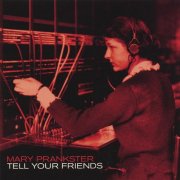 |
Tell Your Friends (2002, 31.16) ***/½ |
|
| Brave New Baby La Resistance Tell Your Friends (part one) Sun Irresponsible Woman Arm's Length Spill None for Me |
Tell Your Friends (part deux) Darlin' |
|
Current availability:
Chamberlin used:
Samantha Johnston used the Ken Kesey-referencing Mary Prankster nom de plume for several years, eventually retiring it in the early 2000s, after three studio albums. The last of these, 2002's Tell Your Friends, despite its fairly ordinary indie-ish pop/rock stylings, is a distinct step up from the usual, not least due to Johnston's lyrics and their delivery. Highlights? Opener Brave New Baby, La Resistance and the propulsive None For Me.
'Prankster' plays (producer Mitch Easter's?) Chamberlin, with what sounds like doubled male/female solo voices somewhat in the background on Sun, although the brass on closer Darlin' is real.
 |
Resoution (1976, 37.06) **/½ |
|
| Resolution If You Could See Yourself (Through My Eyes) Constant Heat Karen's Song Can't Stop My Love Everything Falls Into Place (Lillian's Song) That's When Miracles Occur Some Things Go on Forever |
Treasure That Canary Set Your Sights Love Song |
|
Current availability:
Mellotron used:
Although I've never heard of him before, Andy Pratt is apparently best known for Avenging Annie, a multi-tracked vocal number from his second, eponymous album from 1973. Resolution was his follow-up, three years on and is best described as typical mid-'70s singer-songwriter fare, its arrangements locating it chronologically as surely as carbon dating. If you're into the style, it's probably a good album; certainly some way ahead of the likes of the horrible Leo Sayer, for example, although I wouldn't actually take that as a recommendation. What's the Douglas Adams quote? 'Mostly harmless', that's it, albeit rather irritating in places. The bulk of the album's material washes over me fairly harmlessly, although when the piano balladry got too close to Billy Joel territory (Can't Stop My Love, Everything Falls Into Place), I start twitching a little.
Mellotron on one track, with from Ken Bichel (Average White Band, Stories), with string and cello parts on Set Your Sights, although I've no idea why Pratt chose to use a Mellotron rather than the string section employed on the rest of the album. It's phased on the second chorus, which may be the reason, although I can't imagine why that couldn't be done to the real strings as well. Anyway, Resolution is an album caught in its own time like a fly in amber, with a very inessential Mellotron part, so don't go too far out of your way.
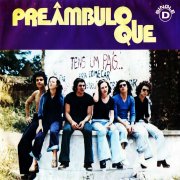 |
7" (1975) **½/T½ Tens um País Longe de Mim e do Mundo |
Current availability:
Mellotron used:
Preâmbulo Que were a 'progressive folk' band from northern Portugal, whatever you take that to mean; I've no idea whether they released anything else, but 1975's Tens Um País is a rather cheesy effort, albeit stopping short of full-blown Europop. Its flip, however, Longe De Mim E Do Mundo, is somewhat better, a slower, folkier effort with a psychedelic guitar solo to liven things up a bit.
The semi-legendary José Cid produces and plays Mellotron, with background strings on the 'A' and a major flute part on the flip. This is available on download blogs, although I wouldn't go too far out of your way; Longe De Mim E Do Mundo is decent enough, but rather uninspired, with little enough Mellotron overall to really make it worth the effort.
See: José Cid
Premiata Forneria Marconi (PFM) (Italy) see: |
 |
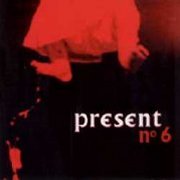 |
No. 6 (1999, 47.12) ****/T |
|
| The Limping Little Girl Part 1 Part 2 Part 3 Part 4 Le Rôdeur Ceux d'en Bas (Suite) Part 1: Le Matin Part 2: Le Rêve de la Nuit |
Part 3: La Realité Part 4: Vers le Cauchemar Part 5: Le Cauchemar Yo Part 6: Le Combat Sworlf |
|
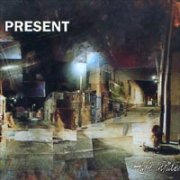 |
High Infidelity (2001, 48.03) ****/TSouls for SaleStrychnine for Christmas Rêve de Fer |
Current availability:
Mellotrons used:
A few years ago, I saw Present play at a Swedish progressive festival. Their drummer hadn't made the gig so, undeterred, they played anyway, largely clearing the hall, which sums up the band's attitude perfectly. They began as a Univers Zero offshoot, formed by guitarist Roger Trigaux, with other UZ members guesting, although the band soon took on a life of its own. Splitting in the mid-'80s, it was a decade before Trigaux put together another lineup under that name, who have worked sporadically ever since. Their music is most easily compared to that of Univers Zero, best described as 'avant rock'; dissonant, repetitive, angular and intense, it's about the furthest you're going to get from 'easy listening' while remaining even vaguely in the realms of progressive rock, although I rather doubt that the band would even consider themselves such.
Trigaux contacted me himself to confirm the Mellotron use on their two most recent studio releases, 1999's No. 6 and High Infidelity from two years later (REO Speedwagon connection, anyone? Thought not...). No. 6 fits the band template to a T, with lengthy opener The Limping Little Girl's edginess setting the tone for the rest of the album. Oddly, Trigaux barely performs on the record, crediting himself mainly with 'composition/musical direction', leaving a five-piece band to actually play his material. Pierre Chevalier provides the slightly Magma-like piano work, plus the Mellotron on Ceux D'en Bas Pt. 6, Le Combat, with some background strings slowly working their way to the front of the mix by the end of the piece.
High Infidelity is, if anything, better than its predecessor, with Trigaux taking more of an active role in the recording this time round. Although two of the album's three tracks are again split into several parts, it seems to be less 'official' than on No. 6, so I haven't included them in the tracklisting above. The music is from the same, angular school as other Present albums, although it may be just a tad more accessible, or maybe it's just that I'm getting used to it; either way, it's all good stuff, particularly the 27-minute Souls For Sale. As with its predecessor, the album was recorded in Tel Aviv and Chevalier does the Mellotron honours again (using Zohar Cohen's machine, also used by Israeli psych/pop monsters Rockfour), though only on his own composition, Strychnine For Christmas. I think the staccato sound over the (real) cello is actually guitar, though it's hard to say, but the strings in the middle of the piece are very obviously Mellotron.
See: Univers Zero
 |
To Whom it May Concern (2003, 50.45) ***/½ |
|
| S.O.B. The Road Between Lights Out Better Beware Nobody Noticed it Sinking in Important So Lovely |
Indifferent Gone To Whom it May Concern |
|
Current availability:
Chamberlin used:
It wouldn't be fair to say that Lisa Marie's (1968-2023) management went out of their way to make her look like the spit of her dad, now would it? OK, it would. The Pelvis would've been proud of the monochrome 'over the shoulder smoulder' she sports on the sleeve of her debut album, To Whom it May Concern, archly raised eyebrow and all. Veteran of three failed marriages (one to Michael Jackson, as I'm sure you'll all remember) and a Scientologist since her teens (troubled celebrity background, eh?), Lisa's finally, at the age of thirty-seven, taken the plunge and followed in her father's footsteps. I was expecting the album to be truly awful, with some name producer shoehorning her into an inappropriate 'R&B' format, so, while I can't really say I particularly like it, I was surprised to find that it sits on the border between singer/songwriter territory and AOR, while Presley has a pleasant, warm contralto voice, proving that she's inherited more than just her father's looks.
Zac Rae (Macy Gray) plays Chamberlin on one track, with rather pointless background strings on Lights Out, which you quite honestly wouldn't spot were they not credited. So; by no means a great album, To Whom it May Concern is still better than expected, but don't go out of your way for its Chamby content.
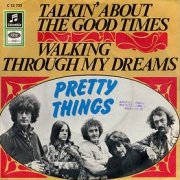 |
7" (1968) ****/TT½ Talkin' About the Good Times Walking Through My Dreams |
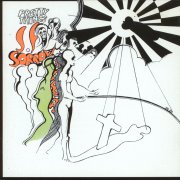 |
S.F. Sorrow (1968, 41.08/57.17) ****½/TTT |
|
| SF Sorrow is Born Bracelets of Fingers She Says Good Morning Private Sorrow Balloon Burning Death Baron Saturday The Journey I See You |
Well of Destiny Trust Old Man Going Loneliest Person [CD adds: Defecting Grey Mr Evasion Talkin' About the Good Times Walking Through My Dreams] |
|
 |
Parachute (1970, 41.03) ***/T½ |
||
| Scene One The Good Mr. Square She Was Tall, She Was High In the Square The Letter Rain Miss Fay Regrets Cries From the Midnight Circus |
Grass Sickle Clowns She's a Lover What's the Use Parachute |
||
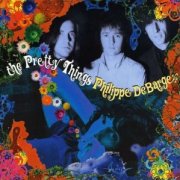 |
Philippe DeBarge (2008, recorded 1969, 44.15) ***½/T |
|
| Hello, How Do You Do You Might Even Say Alexander Send You With Loving You're Running You and Me Peace Eagles Son Graves of Grey |
New Day It'll Never Be Me I'm Checking Out All Gone Now Monsieur Rock (Ballad of Philippe) |
|
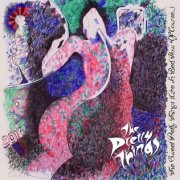 |
The Sweet Pretty Things (Are in Bed Now, of Course...) (2017, 36.51) ****/TTT |
|
| The Same Sun And I Do Renaissance Fair You Took Me By Surprise Dark Days Turn My Head Greenwood Tree Hell, Here and Nowhere |
In the Soukh Dirty Song |
|
Current availability:
Mellotrons used:
The Pretty Things started life as the nastiest beat group in town, out-outraging the Stones wherever they went, until psychedelia suddenly hit. Their first 'interesting' single, Defecting Grey, was good, but Talkin' About The Good Times was an excellent Mellotron and sitar-driven effort, easily the equal of many better-known psych 45s.
Famously, with '68's S.F. Sorrow, the Pretties beat The Who to The First Concept Album (or, appallingly, 'rock opera') crown, although it's only in recent years that they've really been heralded for the feat. [Although I've had it pointed out to me that The Moody Blues beat the pair of 'em.] A fairly straightforward narrative of a man's unhappy life, it hangs together both lyrically and musically, holding up well against its two major contemporaries, the Beatles' Sgt. Pepper and Pink Floyd's Piper at the Gates of Dawn. There's not a bad track on it, highlights including the title track, Balloon Burning and the full-on Baron Saturday. The title track features much Mellotron brass and a little strings for good measure, with other Mellotronic highlights being the swirly string chords and brief flute melody on Baron Saturday, while several other tracks feature the instrument rather more in the background. Thinking about it, S.F. Sorrow has to be one of the earliest 'Mellotron Albums', where it's used in anything more than a supporting role, giving it yet another 'first' in addition to the several it's already chalked up.
It took the band two years to follow S.F. Sorrow - doubtless the exertion involved in being so groundbreaking fair took it out of them. Anyway, Parachute was never really gong to compete, but it's not a bad record, just all a little ordinary in comparison, showing their r'n'b roots more than you might expect. Apparently, John Povey definitely plays the Mellotron this time round, although his use seems to be limited to flutes on The Good Mr. Square and The Letter, with nice, if subdued string parts on Grass and the title track. There's a remote possibility there's more elsewhere, but if so, it's low enough in the mix as to be almost inaudible. Nothing on any of the CD's bonus tracks, either.
Late 2008 brought a belated official release for one of the strangest Pretties stories of all. In 1969, a French playboy, name of Philippe DeBarge, wanted to be a rock star and asked the band if they'd back him, money no object. Being a bit on the skint side, the band agreed, recording an album's-worth of their own material (some of it rescued from their Electric Banana series of library recordings, speaking of strange Pretties tales). Philippe DeBarge is actually a pretty good effort, DeBarge making a fine lead vocalist, falling stylewise in between S.F. Sorrow and Parachute, funnily enough, highlights including Alexander, the acoustic jam You're Running You And Me and closer Monsieur Rock (Ballad Of Philippe). It's probably Povey on Mellotron again, with strings and brass on You Might Even Say, a brief, wildly pitchbent string part (thanks, Zohar) on Eagles Son and what sounds suspiciously like Mellotron guitar on It'll Never Be Me, so no Mellotron classic, but a good album in its own right.
In 2015, Phil May thought he would never sing again, so The Sweet Pretty Things (Are in Bed Now, of Course...) (Dylan quote, fact fans), two years later, is an absolute sodding triumph. Highlights include ripping opener The Same Sun, their take on The Byrds' Renaissance Fair, the stomping Dark Days (best track?), Greenwood Tree... Almost everything, really. Now that we seem to've passed through the era of 'fill up the CD, quality be damned', thirty-something-minute albums are back on the agenda and rightly so, allowing the Pretties to record a short, yet excellent record, with no extraneous mediocrity to drag it down. Second guitarist Frank Holland (once of the mighty England, fact fans) is credited with Mellotron. Yes, I was sceptical, but, even with no evidence to back me up, I think we're looking at The Real Deal here. Anyway, we get background strings on opener The Same Sun, flutes on Renaissance Fair, a brass variant (?) on You Took Me By Surprise, string and flute lines on Dark Days, chordal flutes on Greenwood Tree, a distant choir line, following the vocal, on Still I'm Sad-alike In The Soukh and strings on closer Dirty Song. Listen: Buy This Album.
So; I don't think I really need to recommend S.F. Sorrow to you. You either already know it or should, unless you just happen to have some antipathy towards late-'60s UK psych, in which case I suggest you revise your opinions post-haste. Buy unreservedly, particularly the version with the As and Bs of their two previous singles, including Talkin' About The Good Times. Parachute and Philippe DeBarge are rather more ordinary, but have some nice Mellotron here and there.
See: Twink
 |
White Sky (1999, 41.01) ***½/TTTRaise on HighShake White Sky Summer's End Last Summer Days Walking on the Farm Motorcycles Final Season I'll Be Waiting |
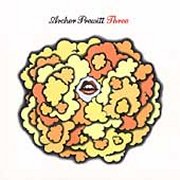 |
Three (2002, 57.54) ***/½ |
|
| Over the Line Tear Me All Away When I'm With You Two Can Play I'm Coming Over Gifts of Love Second Time Trader Atmosphere |
Behind Your Sun No Defense Another Day Sister Ice The Race The Day to Day |
|
 |
Wilderness (2005, 53.50) ***½/TTT |
|
| Way of the Sun Leaders O, Ky Go Away Judy, Judy No More Think Again Cheap Rhyme |
O, Lord Without You Wilderness |
|
Current availability:
Mellotrons used:
Archer Prewitt's career started with The Coctails, before moving on to The Sea & Cake. He runs a solo career alongside playing in the latter, working in the slightly jazzy singer-songwriter area, crossed with what's probably best described as adult pop/rock (sorry).
His second solo effort, 1999's White Sky, typifies his style, mixing more laid-back material (Shake, Summer's End) with slightly (but only slightly) more aggressive stuff (Motorcycles, the title track), most with a vaguely jazzy feel that doesn't overwhelm with its... jazziness. Prewitt plays the Mellotron himself, with an uncredited flute melody on opener Raise On High, full-on strings on Summer's End and more of the same towards the end of Walking On The Farm. Ghostly flutes on Final Season and strings (and flutes?) on closer I'll Be Waiting finish off a surprisingly Mellotron-heavy release.
2002's Three is a rather more mainstream pop/rock thing, I'm afraid and thus a lot less interesting than its predecessor. Don't get me wrong; it has its moments, but nowhere near as many as on White Sky, despite the addition of the occasional Neil Youngism. It's also far less notable on the Mellotron front, with nowt but a few faint string notes on opener Over The Line from Prewitt himself.
Wilderness appeared in January '05 and redressed the Mellotronic balance immediately. The music's better, too, if not a full return to his style of half a decade earlier. I believe that's called 'progression'. No fewer than three credited Mellotron players this time round: Prewitt, Dave Max Crawford and Mark Greenberg, all of whom are kept busy, with a front-of-the-mix flute line at the end of Leaders, a string part and more flute on O, Ky and what sounds like Mellotron strings mixed with real ones on Go Away. I think that's polyphonic Mellotron flutes on No More, but I could be wrong and while the strings on Cheap Rhyme seem to be real, O, Lord and Without You both have Mellotron strings, the latter doubled, again, with real ones, with a chordal flute part on the title track to round things off nicely.
So; two out of three both musically and Mellotronically. Happily, they're the same two. Prewitt's work is probably going to appeal more to those who like to listen to something relaxing but not bland and I'm quite sure many of his songs will grow on the listener given time. After all, how much good music takes a while to get into? I've learned to distrust immediacy; the initial sugar-rush of excitement is all too often followed by the sour taste of ennui. I suspect Archer Prewitt's albums will not be subject to this boom/bust cycle.
See: The Coctails | The Sea & Cake
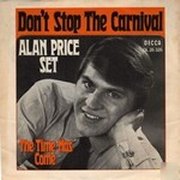 |
7" (1968) **/TT Don't Stop the Carnival The Time Has Come |
 |
7" (1968) **½/½ When I Was a Cowboy Tappy Tortoise |
Current availability:
Mellotrons used:
Alan Price was the guy who played that organ riff on The Animals' immortal version of the traditional The House Of The Rising Sun, notoriously being the only band member with his name on the label (and thus the recipient of all publishing), as 'they ran out of room'. Yeah. Right. He eventually left the band (I'm not surprised, after that), becoming a Professional Geordie for the rest of his career which, at least for the rest of the '60s, was quite profitable.
Price released a couple of Mellotron efforts in 1968 in the shape of his first two singles of that year. The first, Don't Stop The Carnival (a Geordie calypso, for Chrissake?) was backed with the rather better The Time Has Come, the A-side adding background Mellotron mandolins and one of the brass variants, while the flip had rather more obvious strings and flutes. Single #2, When I Was A Cowboy, is immediately recognisable as Leadbelly's Out On The Western Plain, as memorably performed by the late, great Rory Gallagher, but nowhere near (NEAR) as good. Its flip, Tappy Tortoise (presumably in honour of Animals roadie Tappy Wright), is an odd little number, possibly aimed at the younger market, Price intoning the heartwarming story of how some lonely instruments met up and formed a band, backed by an exceedingly faint Mellotron string line.
All four tracks are available on I Put a Spell on You: The Decca Deram Singles A's & B's, along with his better-known solo hits, but I'd have trouble genuinely recommending any of these, for either the music or the Mellotron.
 |
Black Light Revival (2014, 41.35) ***½/TTT½ |
|
| Psychedelic Sunshine Pop Crusader Frozen Fathers Mitchum What's in Your Food? I'm Edgy (a Devotion for '71 Alice) ...Machines of Loving Grace It Was a Very Good Year Is it My Wheels? |
Semi-Automatic Family Man I Love Loosely All the Colours of the Rainbow Fluorescent Flashback |
|
Current availability:
Mellotrons used:
The stupendously-nom-de-plumed Vincent Priceless (no, I don't know his real name) is a New York-based multi-instrumentalist who's been playing since the late '70s, by the look of it. I believe 2014's Black Light Revival is his first solo album, though, a mélange of rock'n'roll, surf and psych stylings, with a smidgeon of turn-of-the-'80s noo wave for good measure. Top tracks include the album's two covers, Sinatra's It Was A Very Good Year and Hugh Cornwell's All The Colours Of The Rainbow, excellent jangly opener Psychedelic Sunshine Pop Crusader, the punchy, Cooper-esque I'm Edgy (A Devotion For '71 Alice) and psych closer Fluorescent Flashback, although, despite the album's relative brevity, it could probably lose a couple of the more bog-standard rock'n'roll numbers.
Mellotronically speaking, Priceless plays both his old M400 and an M4000 (his?), with strings all over opener Psychedelic Sunshine Pop Crusader, less of the same on Frozen Fathers, occasional background choirs on Mitchum, I'm Edgy and Semi-Automatic Family Man, strings and choirs (sometimes background) on What's In Your Food?, I Love Loosely and All The Colours Of The Rainbow, 'everlasting sustain' choirs and swirly strings on ...Machines Of Loving Grace, choirs and pseudo-orchestral strings on It Was A Very Good Year and string section (and brass?) on Fluorescent Flashback. Enough Mellotron? I'm wondering if I've missed anything on Is It My Wheels?; the oboe-ish sound is more likely to be Priceless' generic Yamaha, but I've been wrong before... So; a decent collection of often witty material, with shedloads of very real Mellotron. What's not to like?
 |
Love, Love (1974, 37.52) ***½/T½PrologueLove, Love Images Eternal Worlds Epilogue |
Current availability:
Mellotron used:
Chicago jazz trombonist Julian Priester (sometimes adding 'Pepo Mtodo') played with the legendary Sun Ra in his teens, going on to work with Dinah Washington, Max Roach, Duke Ellington and Herbie Hancock, amongst many others. After two early releases as band leader, 1974's Love, Love was the first of two albums he recorded in the mid-'70s, before returning to sideman-land for another twenty years. His time with Hancock shines through here, the ensemble's fusion moves as good as anything I've heard in the genre, possibly at their best on Images.
Despite quite specific instrument-by-instrument credits, there's no mention of the obvious Mellotron, meaning it could've been played by any of Priester himself, Todd "Bayete Umbra Zindiko" Cochran or Pat Gleeson. It's used on the near-side long title track, with drifting strings a few minutes in, returning, more strongly, some minutes later, the piece ending with solo cellos. I'm no jazz fan, but the raw energy spilling out of this album should make it a decent listen for anyone prepared to step outside their comfort zone.